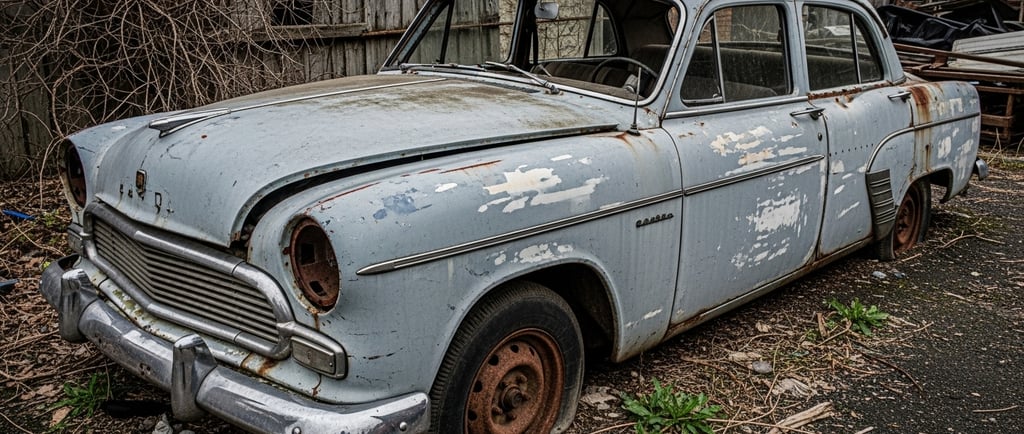What Is Asset Depreciation? (And How to Stop It From Sinking Your Net Worth)
You just bought a brand-new car.
Cristian Ianowich
7/11/20253 min read


You just bought a brand-new car. The smell, the flawless paint, the feeling of being the very first person to drive it—it’s amazing. But in the back of your mind, you’ve probably heard a nagging little voice say, "This car lost value the second I drove it off the lot."
That nagging voice is talking about depreciation.
It's a word we hear in business, but it impacts our personal finances every single day. Understanding it is the difference between watching your net worth slowly leak away and actively building a stronger financial future.
So let’s pull back the curtain on this "value-eater" and learn how to beat it at its own game.
Asset Depreciation: The Silent Drain on Your Money
In the simplest terms, depreciation is the natural decrease in an asset's value over time. This happens for a few key reasons:
Wear and Tear: Using an item simply wears it out.
Age: Things get old and eventually need replacing.
Obsolescence: Newer, better, faster versions come out, making the old one less desirable.
Think about your smartphone. When it was released, it was the best on the market. Two years later, it feels slower, the battery doesn't last as long, and the new model has a mind-blowing camera. That drop in value and desirability is depreciation in action.
It’s the natural opposite of appreciation, which is when an asset (like stocks or well-located real estate) increases in value over time.
Real-World Examples: Where Depreciation Is Hiding
Depreciation isn’t just a business concept; it’s happening all around you. Here are the most common culprits in your personal life.
Your Car: The Classic Case
Vehicles are probably the most famous depreciating asset. Their value doesn't just drop; it plummets. A new car can lose over 20% of its value in the very first year. The biggest hit happens the moment it's no longer "new."
Electronics: The Tech Treadmill
That laptop, 4K TV, or gaming console you bought is in a constant battle with innovation. Companies are always releasing the next generation, which immediately pushes down the value of your current gadgets.
Furniture and Appliances
You might have paid $2,000 for that beautiful sofa, but the moment it enters your home, it becomes "used furniture." While essential for your life, these items rarely hold their monetary value. Unless it's a rare, sought-after antique, you'll likely sell it for a fraction of what you paid.
Now for the good news. You don't have to let depreciation drain your finances.
How to Protect Your Net Worth from Depreciation
The goal isn’t to stop buying things that depreciate—we all need a car, a phone, and a place to sit. The goal is to minimize the damage and be strategic about where your money goes.
Here’s how you can do it:
Think "Gently Used" for Big-Ticket Items This is the ultimate financial cheat code, especially for cars. By buying a car that's 1-3 years old, you let the original owner take the massive, initial depreciation hit. You still get a reliable, modern vehicle without throwing thousands of dollars away.
Prioritize Quality and Longevity When you do buy new, choose items built to last. A cheap washing machine that breaks in three years is far more expensive than a quality one that lasts for ten. Investing in durability slows down the rate of depreciation because you aren't forced to replace things as often.
Shift Your Focus to Appreciating Assets This is the most crucial step. Consciously work to own more things that grow in value than things that lose value. This is how you build real wealth. Funnel your money toward:
The Stock Market: Owning a piece of successful companies (especially through diversified, low-cost index funds or ETFs).
Real Estate: In many markets, property tends to appreciate over the long term.
Yourself: Investing in your own education or skills can dramatically increase your earning potential—the ultimate appreciating asset.
Maintain What You Already Own You can slow down depreciation with simple upkeep. Regular oil changes for your car, protecting your furniture, and keeping electronics clean will extend their useful life and maintain more of their value for longer.
Which of these steps could you take this month? Shifting even a small part of your budget from depreciating goods to appreciating assets can radically change your financial future.
Ultimately, understanding depreciation puts you back in the driver's seat. It allows you to see your purchases not just for what they do for you today, but for how they impact your wealth tomorrow. You can now make deliberate choices that build your net worth, one smart decision at a time.
